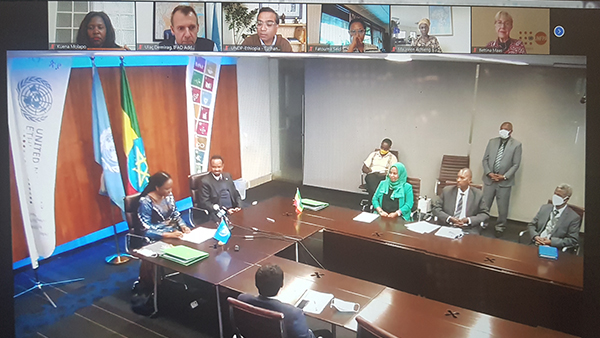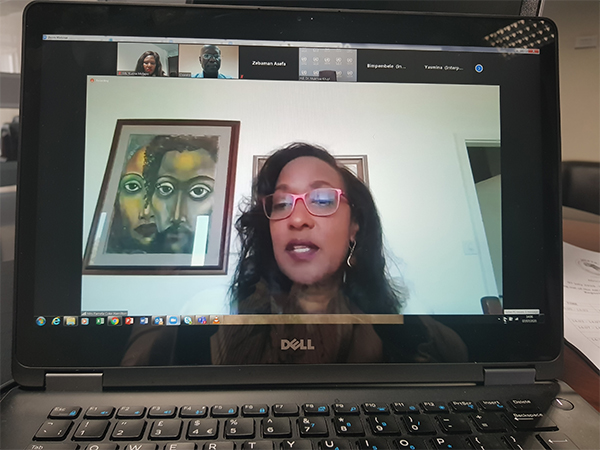
UN resident representative in Ethiopia, Catherine Sozi, and the country's minister of finance, Ahmed Shide, preside over the signing of the UN Sustainable Development Cooperation Framework for the period 2020 to 2025, which UNCTAD helped develop.
In 2020, UNCTAD’s regional office for Africa based in Addis Ababa continued to facilitate and coordinate the organization’s technical assistance for the benefit of the African Union Commission, regional economic communities (RECs), countries and other key stakeholders and partners on the continent.
In June, it co-organized a webinar in celebration of the Micro, Small and Medium-sized Enterprises (MSMEs) Day, attended by over 150 participants. The event examined the role of MSMEs as drivers of post-COVID-19 economic recovery in Africa.
Trade officials, private sector representatives and other stakeholders underlined the need to build the resilience of MSMEs and create a vibrant private sector in Africa for a stronger recovery from the pandemic.
They deliberated on how to address obstacles that inhibit MSMEs’ active participation in African economies and set out required policy recommendations, measures and strategies.
Assessing regional integration in Africa
In addition, the office collaborated with the UN Economic Commission for Africa (UNECA) on the drafting of a forthcoming publication assessing regional integration in Africa.
The publication to be launched in 2021 examines Africa’s services’ trade liberalization and integration under the African Continental Free Trade Area (AfCFTA), under which trading commenced on 1 January 2021. It is a collaborative effort between UNCTAD, the African Union (AU), UNECA and the African Development Bank.
Business empowerment for young women entrepreneurs
UNCTAD also collaborated with UN Women, UNECA and the AU in conducting coaching and capacity-building sessions for over 100 young women entrepreneurs on business opportunities presented by the AfCFTA and risks that need to be addressed, particularly during and after COVID-19.
Participants gained a better understanding of the challenges and trade barriers confronting women-led businesses in Africa and how they could be addressed through gender-responsive AfCFTA policymaking and programming. The sessions informed further capacity-building and technical assistance activities to support women-owned businesses take advantage of new trading opportunities created by the AfCFTA.
Tackling non-tariff barriers
UNCTAD also continued to support the operationalization of the online tool that aims to facilitate quicker and more efficient trade by enabling the identification, reporting, monitoring and elimination of non-tariff barriers (NTBs).
The tool, which became fully functional in January 2020, was gradually opened to state parties, AU member states and RECs that have nominated their AfCFTA NTB focal points, established their national/REC monitoring committees and can institutionally address and resolve reported NTBs.
With the assistance of UNCTAD, 44 of the 54 AU member states that had signed the AfCFTA by the end of 2020 had appointed AfCFTA NTB national focal points. In addition, for effective and efficient resolution of NTBs, the national focal points received training on the use of the online tool.
UNCTAD also conducted awareness-raising activities through workshops, a social media campaign and sessions during the inaugural Africa Integration Day in July, co-organised with the AU.
At the country level in Ethiopia, UNCTAD continued delivering various courses alongside other UN agencies and participated in the development of the country’s UN Sustainable Development Cooperation Framework for the period 2020 to 2025.

Former director of UNCTAD's international trade division, Pamela Coke-Hamilton, delivers remarks during the inaugural Africa Integration Day.


